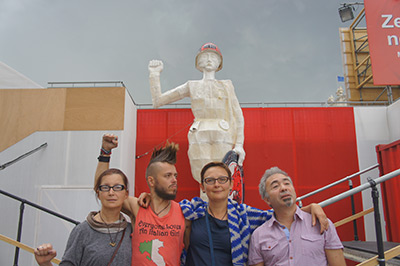Self-Organisation As Method - the case of platform Chto Delat
The heterogeneous composition and the different backgrounds of the nine members of Chto Delat is reflected in the variety of their interests and activities: activism, political philosophy and aesthetics, counter-education and labour conditions are some of the themes that play a continuing and vital role within their methodologies and practices. Using a wide range of media – such as film, theatre plays, radio programmes, publishing, murals and public campaigns among others - and referring to a provocative re-examination of socialism’s past, present and future, CHTO DELAT interrogates the role of the artist and her engagement in society, contributes writing a “dramaturgy” of anti-neoliberalism thinking, and attempts at constructing emancipatory collective practices acting inside and outside the artworld. With the aim of politicizing the production of knowledge, in 2003 the group started publishing the Russian/English newspaper CHTO DELAT to discuss relevant current international political issues and at the same time confront the Russian social and political situations where basic democratic freedoms are under threat. In 2013 they opened The Rosa’s House of Culture, a space in St. Petersburg that questions the legacy of the Soviet tradition of Houses of Culture, a well-spread state-supported infrastructure for leisure and educational activities of people in the Soviet Union. The space hosts different organizations working in the field of activism and alternative education with the aim of imagining a new model for a counter - public sphere. On the same year, they founded The School of Engaged Art, a radical art education initiative aimed at establishing a community of creative workers who use art language as a tool for the transformation of society based on the values of justice and equality. The school is a non-accredited programme that worked closely with about 120 young professionals who now play a decisive role in local public life, organising public campaigns and actions. Its curriculum is intentionally hybrid to experiment with collective practice and challenge the status quo of artistic life and appeal to society at large.
For UNIDEE, artists Nikolay Oleynikov and Dmitry Vilensky from CHTO DELAT will organise a module based on an on-going experiment in performative dramaturgy and film-making, where the very notion of collectivity is questioned and considered as a message, a method, a tool, a desire, an obstacle.
MODULE DESCRIPTION
The main idea of self-organised structures is to keep under their control the full tasks of the creation, production and distribution of art. It realizes its activity in form of creation of “Art Soviets” able to politicize cultural production through a process of collective subjectification. The main goal of this structure is to cultivate political instincts, educate class consciousness and provoke an emancipatory activity in the spheres of labour, politics and aesthetics.
The workshop will address many of our concerns, such as collective agency, convivial tools for education, anti-capitalist practices, the Russian situation, the public as co-creator, radical poverty, inner temporality, a quarrel concerning the common, how to choose between entrism and exodus, non-alienated relations, comradeship, social impact of micro-political interventions, heated editorial process, local optic, experienced-based solidarity, and how art doesn’t simply reflect the world, but takes the risk to change it.
The structure of the workshop will be centred around CHTO DELAT film practice to analyse different forms of communal living, group working, activist politics and aesthetics.
Everyday participants will watch a body of films as a starting point for discussion and activities on collectivism. For example, in Builders (2005) the artists re-imagine the significance of the pose assumed by workers in the famous Soviet painting “The Builders of Bratsk” (1961) by Viktor Popkov; while in The New Deadline #17 Summer School of Orientation in Zapatism (2017) it is documented the life of a group of young people that lived for two weeks in a commune in an attempt to become one politicised body; or in One night (2019), which reasons on how current populist politics is shaping our collective emotions manipulating our sense of self.
Through a number of body exercises – such as practices of comradeship –, a series of communal activities – such as cooking together - and discussions – such as asking while walking –, participants will consider things like consent, care, solidarity and resistance.

BIOGRAPHY
Chto Delat (What is to be done?) was founded in early 2003 in Petersburg by a workgroup of artists, critics, philosophers and writers from St. Petersburg, Moscow, and Nizhny Novgorod with the goal of merging political theory, art and activism. The group was constituted in May 2003 in St. Petersburg in an action called “The Refoundation of Petersburg”. Shortly afterwards, the original, as yet nameless, core group began publishing an international newspaper called Chto Delat?. The name of the group derives from a novel by the Russian 19th century writer Nikolai Chernyshevsky, and immediately brings to mind the first socialist workers’ self-organizations in Russia, which Lenin actualized in his own publication “What is to be done?” (1902). Chto Delat sees itself as an artistic cell and also as a community organizer for a variety of cultural activities intent on politicizing “knowledge production”.In 2013, Chto Delat initiated an educational platform— the School of Engaged Art in Petersburg - and also runs a space called Rosa’s House of Culture. From its inception, the collective has been publishing an English-Russian newspaper focused on the urgent issues of Russian cultural politics, in dialogue with the international context. In 2014 the collective withdrew from the participation in Manifesta 14 in Petersburg as a local protest against the development of the Russian military intervention in Ukraine and with this act has triggered a current debate on the participation in and boycott of art events.
Their artistic activity is realized across a range of media — from video and theatre plays to radio programmes and murals — and includes art projects, seminars and public campaigns. The works of the collective are characterized by the use of alienation effect, surreal scenery, typicality and always case-based analyses of concrete social and political struggles. The aesthetics of the group is based also on heretically unpacking the artistic devices offered by Bertolt Brecht, Jean-Luck Godard and Reiner Fassbinder. The collective strongly focuses on the issue of cultural workers’ labour rights.
These activities are coordinated by a core group including Tsaplya Olga Egorova (artist), Artiom Magun (philosopher), Nikolay Oleynikov (artist), Natalia Pershina / Glucklya (artist), Alexey Penzin (philosopher), Alexander Skidan (poet and critic), Oxana Timofeeva (philosopher), Dmitry Vilensky (artist) and Nina Gasteva (choreographer).
Recent exhibitions include: MUAC (The Museo Universitario Arte Contemporáneo), Mexico (solo show 2017); KOW BERLIN (solo shows 2017 and 2015), San Paulo Biennale (2014); Art, Really Useful Knowledge, Museo Nacional Centro de Arte Reina Sofía, Madrid (2014); Art Turning Left: How Values Changed Making 1789–2013, Tate Liverpool, Liverpool (2013); FORMER WEST: Documents, Constellations, Prospects, Haus der Kulturen der Welt, Berlin (2013); 10th Gwangju Biennale, Gwangju (2012); Chto Delat in Baden-Baden, Staatliche Kuntsthalle, Baden-Baden (2011); Chto Delat Perestroika: Twenty Years After: 2011–1991, Kölnischer Kunstverein, Cologne (2011); Ostalgia, New Museum, New York (2011); Study, Study and Act Again, Moderna Galerija, Ljubljana (solo show 2011); The Urgent Need to Struggle, Institute of Contemporary Art, London (2010).
Museum collections: The Museum of Modern Art, New York; Van Abbemuseum, Eindhoven; Museum Reina Sophia, Madrid; Le Centre Pompidou, Paris; MUDAM, Luxemburg; Tretyakov Art Gallery, Moscow; KIASMA, Museum for Contemporary Art, Helsinki; Kadist Art Foundation, San Francisco; Museum of Conteporary Art, Belgrade and many others.
* The participation fee includes accomodation and breakfast.









